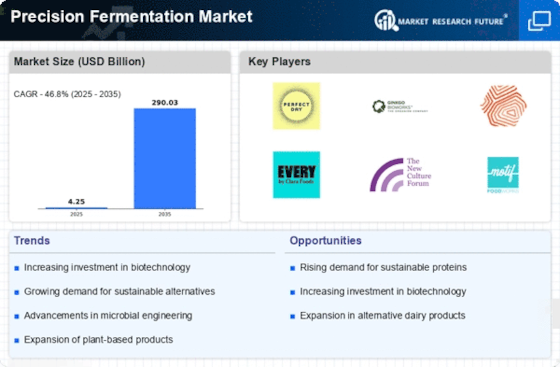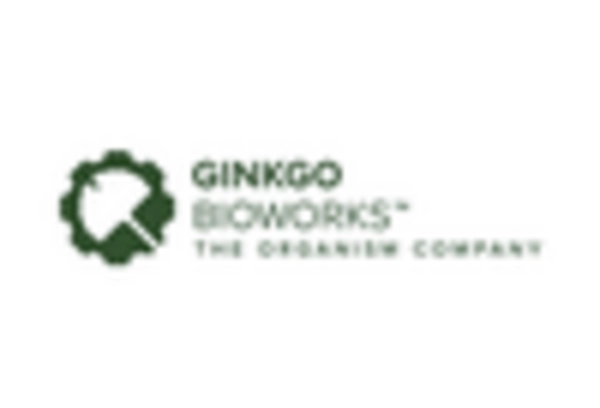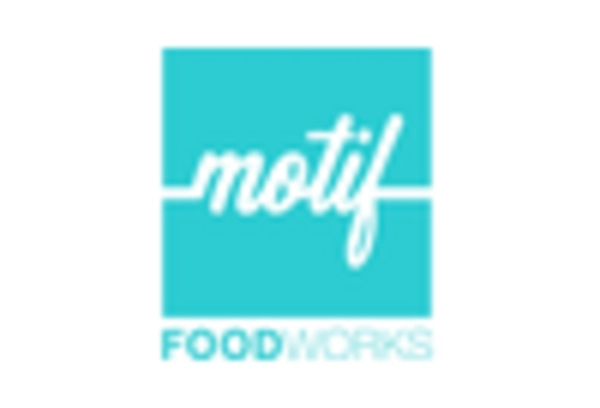Food Production
Animal Feed
Nutraceuticals
Bioplastics
Biofuels
Food Industry
Pharmaceutical Industry
Agricultural Sector
Cosmetics Industry
Bacteria
Yeast
Fungi
Proteins
Enzymes
Vitamins
Amino Acids
North America
Europe
South America
Asia Pacific
Middle East and Africa
North America Outlook (USD Billion, 2019-2035)
North America Precision Fermentation Market by Application Type
Food Production
Animal Feed
Nutraceuticals
Bioplastics
Biofuels
North America Precision Fermentation Market by End User Type
Food Industry
Pharmaceutical Industry
Agricultural Sector
Cosmetics Industry
North America Precision Fermentation Market by Microorganism Type
Bacteria
Yeast
Fungi
North America Precision Fermentation Market by Product Type
Proteins
Enzymes
Vitamins
Amino Acids
North America Precision Fermentation Market by Regional Type
US
Canada
US Outlook (USD Billion, 2019-2035)
US Precision Fermentation Market by Application Type
Food Production
Animal Feed
Nutraceuticals
Bioplastics
Biofuels
US Precision Fermentation Market by End User Type
Food Industry
Pharmaceutical Industry
Agricultural Sector
Cosmetics Industry
US Precision Fermentation Market by Microorganism Type
Bacteria
Yeast
Fungi
US Precision Fermentation Market by Product Type
Proteins
Enzymes
Vitamins
Amino Acids
CANADA Outlook (USD Billion, 2019-2035)
CANADA Precision Fermentation Market by Application Type
Food Production
Animal Feed
Nutraceuticals
Bioplastics
Biofuels
CANADA Precision Fermentation Market by End User Type
Food Industry
Pharmaceutical Industry
Agricultural Sector
Cosmetics Industry
CANADA Precision Fermentation Market by Microorganism Type
Bacteria
Yeast
Fungi
CANADA Precision Fermentation Market by Product Type
Proteins
Enzymes
Vitamins
Amino Acids
Europe Outlook (USD Billion, 2019-2035)
Europe Precision Fermentation Market by Application Type
Food Production
Animal Feed
Nutraceuticals
Bioplastics
Biofuels
Europe Precision Fermentation Market by End User Type
Food Industry
Pharmaceutical Industry
Agricultural Sector
Cosmetics Industry
Europe Precision Fermentation Market by Microorganism Type
Bacteria
Yeast
Fungi
Europe Precision Fermentation Market by Product Type
Proteins
Enzymes
Vitamins
Amino Acids
Europe Precision Fermentation Market by Regional Type
Germany
UK
France
Russia
Italy
Spain
Rest of Europe
GERMANY Outlook (USD Billion, 2019-2035)
GERMANY Precision Fermentation Market by Application Type
Food Production
Animal Feed
Nutraceuticals
Bioplastics
Biofuels
GERMANY Precision Fermentation Market by End User Type
Food Industry
Pharmaceutical Industry
Agricultural Sector
Cosmetics Industry
GERMANY Precision Fermentation Market by Microorganism Type
Bacteria
Yeast
Fungi
GERMANY Precision Fermentation Market by Product Type
Proteins
Enzymes
Vitamins
Amino Acids
UK Outlook (USD Billion, 2019-2035)
UK Precision Fermentation Market by Application Type
Food Production
Animal Feed
Nutraceuticals
Bioplastics
Biofuels
UK Precision Fermentation Market by End User Type
Food Industry
Pharmaceutical Industry
Agricultural Sector
Cosmetics Industry
UK Precision Fermentation Market by Microorganism Type
Bacteria
Yeast
Fungi
UK Precision Fermentation Market by Product Type
Proteins
Enzymes
Vitamins
Amino Acids
FRANCE Outlook (USD Billion, 2019-2035)
FRANCE Precision Fermentation Market by Application Type
Food Production
Animal Feed
Nutraceuticals
Bioplastics
Biofuels
FRANCE Precision Fermentation Market by End User Type
Food Industry
Pharmaceutical Industry
Agricultural Sector
Cosmetics Industry
FRANCE Precision Fermentation Market by Microorganism Type
Bacteria
Yeast
Fungi
FRANCE Precision Fermentation Market by Product Type
Proteins
Enzymes
Vitamins
Amino Acids
RUSSIA Outlook (USD Billion, 2019-2035)
RUSSIA Precision Fermentation Market by Application Type
Food Production
Animal Feed
Nutraceuticals
Bioplastics
Biofuels
RUSSIA Precision Fermentation Market by End User Type
Food Industry
Pharmaceutical Industry
Agricultural Sector
Cosmetics Industry
RUSSIA Precision Fermentation Market by Microorganism Type
Bacteria
Yeast
Fungi
RUSSIA Precision Fermentation Market by Product Type
Proteins
Enzymes
Vitamins
Amino Acids
ITALY Outlook (USD Billion, 2019-2035)
ITALY Precision Fermentation Market by Application Type
Food Production
Animal Feed
Nutraceuticals
Bioplastics
Biofuels
ITALY Precision Fermentation Market by End User Type
Food Industry
Pharmaceutical Industry
Agricultural Sector
Cosmetics Industry
ITALY Precision Fermentation Market by Microorganism Type
Bacteria
Yeast
Fungi
ITALY Precision Fermentation Market by Product Type
Proteins
Enzymes
Vitamins
Amino Acids
SPAIN Outlook (USD Billion, 2019-2035)
SPAIN Precision Fermentation Market by Application Type
Food Production
Animal Feed
Nutraceuticals
Bioplastics
Biofuels
SPAIN Precision Fermentation Market by End User Type
Food Industry
Pharmaceutical Industry
Agricultural Sector
Cosmetics Industry
SPAIN Precision Fermentation Market by Microorganism Type
Bacteria
Yeast
Fungi
SPAIN Precision Fermentation Market by Product Type
Proteins
Enzymes
Vitamins
Amino Acids
REST OF EUROPE Outlook (USD Billion, 2019-2035)
REST OF EUROPE Precision Fermentation Market by Application Type
Food Production
Animal Feed
Nutraceuticals
Bioplastics
Biofuels
REST OF EUROPE Precision Fermentation Market by End User Type
Food Industry
Pharmaceutical Industry
Agricultural Sector
Cosmetics Industry
REST OF EUROPE Precision Fermentation Market by Microorganism Type
Bacteria
Yeast
Fungi
REST OF EUROPE Precision Fermentation Market by Product Type
Proteins
Enzymes
Vitamins
Amino Acids
APAC Outlook (USD Billion, 2019-2035)
APAC Precision Fermentation Market by Application Type
Food Production
Animal Feed
Nutraceuticals
Bioplastics
Biofuels
APAC Precision Fermentation Market by End User Type
Food Industry
Pharmaceutical Industry
Agricultural Sector
Cosmetics Industry
APAC Precision Fermentation Market by Microorganism Type
Bacteria
Yeast
Fungi
APAC Precision Fermentation Market by Product Type
Proteins
Enzymes
Vitamins
Amino Acids
APAC Precision Fermentation Market by Regional Type
China
India
Japan
South Korea
Malaysia
Thailand
Indonesia
Rest of APAC
CHINA Outlook (USD Billion, 2019-2035)
CHINA Precision Fermentation Market by Application Type
Food Production
Animal Feed
Nutraceuticals
Bioplastics
Biofuels
CHINA Precision Fermentation Market by End User Type
Food Industry
Pharmaceutical Industry
Agricultural Sector
Cosmetics Industry
CHINA Precision Fermentation Market by Microorganism Type
Bacteria
Yeast
Fungi
CHINA Precision Fermentation Market by Product Type
Proteins
Enzymes
Vitamins
Amino Acids
INDIA Outlook (USD Billion, 2019-2035)
INDIA Precision Fermentation Market by Application Type
Food Production
Animal Feed
Nutraceuticals
Bioplastics
Biofuels
INDIA Precision Fermentation Market by End User Type
Food Industry
Pharmaceutical Industry
Agricultural Sector
Cosmetics Industry
INDIA Precision Fermentation Market by Microorganism Type
Bacteria
Yeast
Fungi
INDIA Precision Fermentation Market by Product Type
Proteins
Enzymes
Vitamins
Amino Acids
JAPAN Outlook (USD Billion, 2019-2035)
JAPAN Precision Fermentation Market by Application Type
Food Production
Animal Feed
Nutraceuticals
Bioplastics
Biofuels
JAPAN Precision Fermentation Market by End User Type
Food Industry
Pharmaceutical Industry
Agricultural Sector
Cosmetics Industry
JAPAN Precision Fermentation Market by Microorganism Type
Bacteria
Yeast
Fungi
JAPAN Precision Fermentation Market by Product Type
Proteins
Enzymes
Vitamins
Amino Acids
SOUTH KOREA Outlook (USD Billion, 2019-2035)
SOUTH KOREA Precision Fermentation Market by Application Type
Food Production
Animal Feed
Nutraceuticals
Bioplastics
Biofuels
SOUTH KOREA Precision Fermentation Market by End User Type
Food Industry
Pharmaceutical Industry
Agricultural Sector
Cosmetics Industry
SOUTH KOREA Precision Fermentation Market by Microorganism Type
Bacteria
Yeast
Fungi
SOUTH KOREA Precision Fermentation Market by Product Type
Proteins
Enzymes
Vitamins
Amino Acids
MALAYSIA Outlook (USD Billion, 2019-2035)
MALAYSIA Precision Fermentation Market by Application Type
Food Production
Animal Feed
Nutraceuticals
Bioplastics
Biofuels
MALAYSIA Precision Fermentation Market by End User Type
Food Industry
Pharmaceutical Industry
Agricultural Sector
Cosmetics Industry
MALAYSIA Precision Fermentation Market by Microorganism Type
Bacteria
Yeast
Fungi
MALAYSIA Precision Fermentation Market by Product Type
Proteins
Enzymes
Vitamins
Amino Acids
THAILAND Outlook (USD Billion, 2019-2035)
THAILAND Precision Fermentation Market by Application Type
Food Production
Animal Feed
Nutraceuticals
Bioplastics
Biofuels
THAILAND Precision Fermentation Market by End User Type
Food Industry
Pharmaceutical Industry
Agricultural Sector
Cosmetics Industry
THAILAND Precision Fermentation Market by Microorganism Type
Bacteria
Yeast
Fungi
THAILAND Precision Fermentation Market by Product Type
Proteins
Enzymes
Vitamins
Amino Acids
INDONESIA Outlook (USD Billion, 2019-2035)
INDONESIA Precision Fermentation Market by Application Type
Food Production
Animal Feed
Nutraceuticals
Bioplastics
Biofuels
INDONESIA Precision Fermentation Market by End User Type
Food Industry
Pharmaceutical Industry
Agricultural Sector
Cosmetics Industry
INDONESIA Precision Fermentation Market by Microorganism Type
Bacteria
Yeast
Fungi
INDONESIA Precision Fermentation Market by Product Type
Proteins
Enzymes
Vitamins
Amino Acids
REST OF APAC Outlook (USD Billion, 2019-2035)
REST OF APAC Precision Fermentation Market by Application Type
Food Production
Animal Feed
Nutraceuticals
Bioplastics
Biofuels
REST OF APAC Precision Fermentation Market by End User Type
Food Industry
Pharmaceutical Industry
Agricultural Sector
Cosmetics Industry
REST OF APAC Precision Fermentation Market by Microorganism Type
Bacteria
Yeast
Fungi
REST OF APAC Precision Fermentation Market by Product Type
Proteins
Enzymes
Vitamins
Amino Acids
South America Outlook (USD Billion, 2019-2035)
South America Precision Fermentation Market by Application Type
Food Production
Animal Feed
Nutraceuticals
Bioplastics
Biofuels
South America Precision Fermentation Market by End User Type
Food Industry
Pharmaceutical Industry
Agricultural Sector
Cosmetics Industry
South America Precision Fermentation Market by Microorganism Type
Bacteria
Yeast
Fungi
South America Precision Fermentation Market by Product Type
Proteins
Enzymes
Vitamins
Amino Acids
South America Precision Fermentation Market by Regional Type
Brazil
Mexico
Argentina
Rest of South America
BRAZIL Outlook (USD Billion, 2019-2035)
BRAZIL Precision Fermentation Market by Application Type
Food Production
Animal Feed
Nutraceuticals
Bioplastics
Biofuels
BRAZIL Precision Fermentation Market by End User Type
Food Industry
Pharmaceutical Industry
Agricultural Sector
Cosmetics Industry
BRAZIL Precision Fermentation Market by Microorganism Type
Bacteria
Yeast
Fungi
BRAZIL Precision Fermentation Market by Product Type
Proteins
Enzymes
Vitamins
Amino Acids
MEXICO Outlook (USD Billion, 2019-2035)
MEXICO Precision Fermentation Market by Application Type
Food Production
Animal Feed
Nutraceuticals
Bioplastics
Biofuels
MEXICO Precision Fermentation Market by End User Type
Food Industry
Pharmaceutical Industry
Agricultural Sector
Cosmetics Industry
MEXICO Precision Fermentation Market by Microorganism Type
Bacteria
Yeast
Fungi
MEXICO Precision Fermentation Market by Product Type
Proteins
Enzymes
Vitamins
Amino Acids
ARGENTINA Outlook (USD Billion, 2019-2035)
ARGENTINA Precision Fermentation Market by Application Type
Food Production
Animal Feed
Nutraceuticals
Bioplastics
Biofuels
ARGENTINA Precision Fermentation Market by End User Type
Food Industry
Pharmaceutical Industry
Agricultural Sector
Cosmetics Industry
ARGENTINA Precision Fermentation Market by Microorganism Type
Bacteria
Yeast
Fungi
ARGENTINA Precision Fermentation Market by Product Type
Proteins
Enzymes
Vitamins
Amino Acids
REST OF SOUTH AMERICA Outlook (USD Billion, 2019-2035)
REST OF SOUTH AMERICA Precision Fermentation Market by Application Type
Food Production
Animal Feed
Nutraceuticals
Bioplastics
Biofuels
REST OF SOUTH AMERICA Precision Fermentation Market by End User Type
Food Industry
Pharmaceutical Industry
Agricultural Sector
Cosmetics Industry
REST OF SOUTH AMERICA Precision Fermentation Market by Microorganism Type
Bacteria
Yeast
Fungi
REST OF SOUTH AMERICA Precision Fermentation Market by Product Type
Proteins
Enzymes
Vitamins
Amino Acids
MEA Outlook (USD Billion, 2019-2035)
MEA Precision Fermentation Market by Application Type
Food Production
Animal Feed
Nutraceuticals
Bioplastics
Biofuels
MEA Precision Fermentation Market by End User Type
Food Industry
Pharmaceutical Industry
Agricultural Sector
Cosmetics Industry
MEA Precision Fermentation Market by Microorganism Type
Bacteria
Yeast
Fungi
MEA Precision Fermentation Market by Product Type
Proteins
Enzymes
Vitamins
Amino Acids
MEA Precision Fermentation Market by Regional Type
GCC Countries
South Africa
Rest of MEA
GCC COUNTRIES Outlook (USD Billion, 2019-2035)
GCC COUNTRIES Precision Fermentation Market by Application Type
Food Production
Animal Feed
Nutraceuticals
Bioplastics
Biofuels
GCC COUNTRIES Precision Fermentation Market by End User Type
Food Industry
Pharmaceutical Industry
Agricultural Sector
Cosmetics Industry
GCC COUNTRIES Precision Fermentation Market by Microorganism Type
Bacteria
Yeast
Fungi
GCC COUNTRIES Precision Fermentation Market by Product Type
Proteins
Enzymes
Vitamins
Amino Acids
SOUTH AFRICA Outlook (USD Billion, 2019-2035)
SOUTH AFRICA Precision Fermentation Market by Application Type
Food Production
Animal Feed
Nutraceuticals
Bioplastics
Biofuels
SOUTH AFRICA Precision Fermentation Market by End User Type
Food Industry
Pharmaceutical Industry
Agricultural Sector
Cosmetics Industry
SOUTH AFRICA Precision Fermentation Market by Microorganism Type
Bacteria
Yeast
Fungi
SOUTH AFRICA Precision Fermentation Market by Product Type
Proteins
Enzymes
Vitamins
Amino Acids
REST OF MEA Outlook (USD Billion, 2019-2035)
REST OF MEA Precision Fermentation Market by Application Type
Food Production
Animal Feed
Nutraceuticals
Bioplastics
Biofuels
REST OF MEA Precision Fermentation Market by End User Type
Food Industry
Pharmaceutical Industry
Agricultural Sector
Cosmetics Industry
REST OF MEA Precision Fermentation Market by Microorganism Type
Bacteria
Yeast
Fungi
REST OF MEA Precision Fermentation Market by Product Type
Proteins
Enzymes
Vitamins
Amino Acids


















Leave a Comment